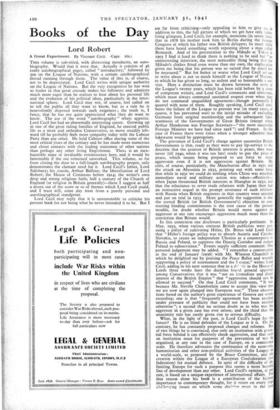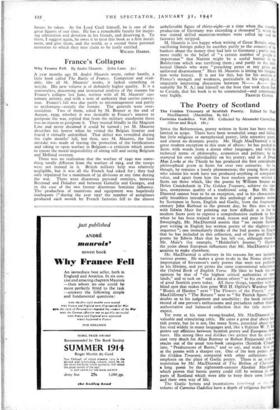Books of the Day
Lord Robert
A Great Experiment. By Viscount Cecil. (Cape. 16s.) Tins volume is sub-titled, with distressing mendacity, an auto- biography. Would that it were that. Actually it consists of 46 really autobiographical pages, called "introductory," followed by 300 on the League of Nations, with a certain dutobiographical thread running through them. The value of this is, of course, not to be depreciated. Lord Cecil writes with unique authority on the League of Nations. But the very recognition he has won as leader in that great crusade makes his followers and admirers much more eager than he realises to hear about his personal life and the evolution of his political ideas, particularly in the inter- national sphere. Lord Cecil may not, of course, feel called on to tell the public all they want to know, but as a rule he is benevolently disposed towards such exigences ; the truth is, I fancy, that he has not quite appreciated what they do want to know. The use of the word " autobiography " whets appetite. Lord Cecil has had an abnormally interesting career. Growing up in one of the great ruling families of England, he entered public life as a strait and orthodox Conservative, to move steadily left- ward till he probably feels more sympathy today with the Labour Party than any other. He held Cabinet office during some of the most critical years of the century and he has made more numerous and closer contacts with the leading statesmen of other nations than perhaps any other living Englishman. There is an inex- haustible mine of invaluable reminiscence here and it would be lamentable if the ore remained unworked. This volume, so far from closing the door to a full-length autobiography proper, only demonstrates the clamant need for it. Lord Cecil's father, Lord Salisbury; his cousin, Arthur Balfour; the liberalisation of Lord Robert; the House of Commons before 1914; the writer's own deep and strong religious faith; half a century of the Church of England (or religion in Britain generally)—these I suggest as half a dozen out of the score or so of themes which Lord Cecil could, and I trust will, some day treat from a purely personal and autobiographical standpoint.
Lord Cecil may reply that it is unreasonable Co criticise his present book for not being what he never intended it to be. But I
am far from criticising—only appealing to him to 'give us, in addition to this, the full picture of which we get here only tanta- lising glimpses. Lord Cecil, for example, mentions (in-seven lines; that in 1878 his mother took him to Berlin during the famous Congress at which his father was British delegate; he must while there have heard something worth repeating about a man called Bismarck. And of his presentation to the Mikado at Tokyo in 1905 I find it. hard to think there is nothing to be said but " an uninteresting interview, the most noticeable thing being that the Mikado's clothes fitted even worse than my own, the explanation given me being that his person was so sacred that he could not be measured." But for better or worse what Lord Cecil set out to write about is not so much himself as the League of Nations, to which he has given so long, so ardent and so honourable a ser- vice. Here a distinction must be drawn between the story of the League's twenty years, which has been told before by a score of competent writers, and Lord Cecil's comments and criticisms, which must always command unstinted respect even when they do not command unqualified agreement—though personally I quarrel with none of them. Roughly speaking, Lord Cecil attri- butes the failure of the League to prevent war (in many cases, of course, it has prevented war) to the initial mistake of excluding Germany from original membership and - the subsequent luke. wammess of the Governments of Great Britain (except when Arthur Henderson was Foreign Secretary—" the most successful Foreign Minister we have had since 1918") and France. In the case of France there were times when a stronger adjective than lukewarm would be appropriate.
The gravamen of Lord Cecil's charge against successive British Governments is that, ready as they were to pay lip-service to the doctrine that the greatest of British interests is peace, they were never (till 1940, when it was too late) ready to pay the price of peace, which means being prepared to use force to resist aggression even if it is not aggression against Britain. He cites, of course, particularly, the Manchurian affair in 1931 and the attack on Abyssinia in 1935, pointing out with some force that while in 1931 we could do nothing when China was attacked, immediate naval and military action was taken—effectively- when Japan threatened British interests at Shanghai in 1932; and that the reluctance to sever trade relations with Japan then had an instructive sequel in the prompt severance of such relations with Russia when British engineers in that country were arrested and put on trial in 1933. More generally the suggestion is that the rooted British (or British Government's) objection to con- tracting binding commitments is the root cause of the present trouble, for doubt whether Britain would move against an aggressor at any rate encourages aggression much more than the conviction that Britain would.
In this connexion one disclosure is particularly pertinent. In May, 1933, when various eminent British publicists were pur- suing a policy of cultivating Hitler, Dr. Benes told Lord Cecil that "Hitler's foreign policy was to absorb Austria and Czecho- Slovakia, to create an independent Ukraine as a counterpoise to Russia and Poland, to suppress the Danzig Corridor and reduce Poland to subservience." Events supply sufficient comment. One personal judgement may be added. "I remember a conversation at the end of January (1936) with Mr. Winston Churchill in which he delighted me by praising the Peace Ballot and warmly supporting a policy of rearmament and the I eague," writes Lord Cecil, adding in his next sentence that in a de' -to in the House of Lords three weeks later the doctrine found general approval among Conservatives that it was "not an immediate and direct interest of the British Empire" that "aggression should not be allowed to succeed." On that Lord Cecil comments, "It was because Mr. Neville Chamberlain came to accept this view that we are now again plunged into European war." Three observa- tions based on the author's great experience of Geneva are worth recording; one is that "frequently agreement has been reached under pressure of publicity that could not have been reached otherwise "; a second that no serious doubt as to who was the aggressor in a given case has ever arisen; and the third that the unanimity rule has rarely given rise to serious difficulty. What, in the light of the past, is Lord Cecil's hope for the future? He is no blind defender of the League as it is. On the contrary, he has constantly proposed changes and reforms. But of two things he is convinced, that only an institution with poten- tial force behind it can effectively check aggression, and that such an institution must for purposes of the prevention of war be organised, at any rate in the case of Europe; on a continental scale. He therefore advocates the continuance of the economic' humanitarian and other non-political activities of the League of a world-scale, as proposed by the Bruce Committee, and the creation within the League of a European Confederation (Oft federation) for mutual defence. In spite of the difficulty of de- limiting Europe for such a purpose this seems a more hopeful line of development than any other. Lord Cecil's opinion, at all rate, is based on a unique experience of international affairs. Fa that reason alone his book is a contribution of the hieheet :importance to contemporary thought, for it raises on every Page chaleng'ng issues on which some de&-■rm must in the rl
future be taken. As for Lord Cecil himself, he is one of the great figures of our time. He has a remarkable faculty for inspir- ing admiration and devotion in his friends, and deserving it. To them, I suggest again, he owes it to treat this book as a first instal- ment, and give them, and the world, as a second those personal memories to which they may claim to be justly entitled.
WILSON HARRIS.































 Previous page
Previous page